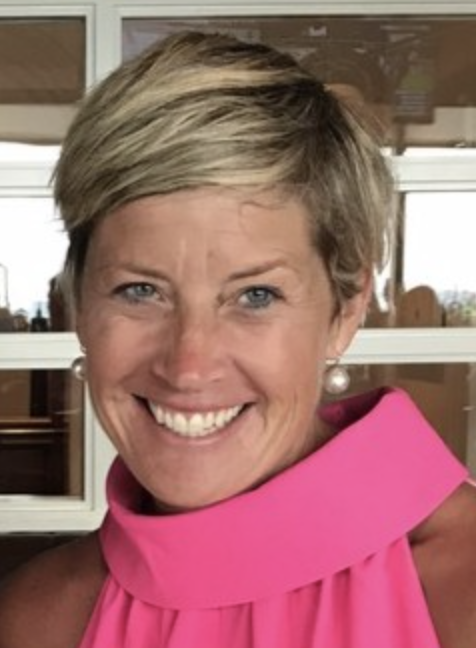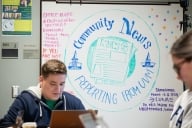You have /5 articles left.
Sign up for a free account or log in.
Q: Jill, tell us about your role as vice president of digital strategy and online education at Fairfield University.
A: This spring, I joined the Fairfield team to help the university work toward its strategic goal of expanding its online programs. Clearly, it was an interesting time to begin a new position and launch an institutional strategic initiative. Our initial goal is to focus on online graduate programs in a thoughtful way that remains true to Fairfield’s educational and Jesuit identity. It’s really the perfect position for me because, for those of you who know me, I really enjoy building: relationships, partnerships and teams, while envisioning the future of an organization.
At Fairfield, I’m fortunate to build external and internal relationships as the position is cross-institutional and also strategic, meaning, we’re not only looking at the next 12 to 18 months, we’re looking at building a piece of the future of Fairfield University. Also, I have to say that the opportunity to work directly for President Nemec was a draw for me. Having both a corporate and academic background makes him a unique higher education visionary and I expect we’ll continue to see university leadership positions move in a similar direction.
So on a typical day, I find myself moving projects forward with a variety of external partners and my friends across the campus. In broader institutional meetings, I can literally look at my Zoom tiles and say, "wow, I get to work with this diverse group of people with varying knowledge bases on a daily basis to make this strategic vision a reality." It’s taking their knowledge, coupled with best practices and research in online learning, and combining them with my abilities to network, be agile and think both innovatively and strategically that makes the role a perfect fit for me.
Now, for those of you who have built a unit, especially in online, from the bottom up, I’m not going to lie, there are daily challenges and, on some days, what feels like an insurmountable amount of work. But with every challenge, I’m learning how to be a better leader and to think in different ways. I’m grateful for the variety of colleagues and friends that I’ve met over the years who provide support and fresh perspectives on these challenges.
Q: What was the career path that led you to your current role? Can you offer any advice to other alt-acs who are thinking about navigating their higher ed careers?
A: It’s funny, Josh, before I started reading your alt-ac columns in Inside Higher Ed, I never thought of myself as an alt-ac but, here I am!
About 15 years ago, I started teaching and mentoring adult learners online and was fortunate to have a phenomenal mentor, Meg Benke at SUNY Empire State College. She challenged me in my thoughts around teaching and learning, provided me with opportunities to be involved in a variety of institutionwide projects, and encouraged me to complete my Ph.D. In my six years working with Meg, my passion for teaching and learning in the online environment grew, and some of my natural talents to lead, build relationships and be a visionary thinker and builder.
I transitioned to working for a for-profit institution, where I learned … a lot! Again, I was encouraged to build and explore new opportunities for the institution and I also learned that all for-profits aren’t bad. At that institution, I was on the provost career track when the opportunity to work at the Online Learning Consortium presented itself. I guess that was the fork in the road that led me to my alt-ac career.
The opportunity to work on a national level intrigued me -- to learn from a multitude and great variety of schools and to move the field of online learning research forward. Here I learned how much I value learning from others, and, again collaborating on a multitude of projects that involved a variety of colleges and universities. I was fortunate to develop the Leadership Network and work with university leadership from around the country, as well as help provide more notoriety to the Online Learning Journal. This work was recognized when I was named an OLC Fellow, which expanded my network of colleagues and thought leaders in the field even further.
Continuing with consortium work, I took a big leap to the Unizin Consortium, which I hadn’t even heard of prior to being recruited to work there. This was another alt-ac pivot as I worked with 13 of the largest R-1 institutions in the country and had to learn a lot, quickly, about big data and IT infrastructure. For context, a lot of these institutions are larger than my hometown, so having a direct view of operational structures at these institutions and access to their leadership was another extremely valuable way for me to expand my knowledge of higher education infrastructure.
So I guess I really am an alt-ac given I still dabble in writing and presentations that are more typical of an academic. But many of my professional passions are alternative, as is the path I’ve taken to my current role. In the past year, I’ve been taking on more external opportunities that allow me to give back to the field and mentor those new in their professions. My advice to these newcomers, or those looking for a career shift to an alt-ac career, is the same advice I give my daughter: keep all of your doors open. By that I mean, don’t miss out on an opportunity to learn something new, network or explore your interests.
Oftentimes, this isn’t easy to do, so it involves finding that extra stamina after a long day, or a long conference. Be open to learning from others; not only the experts in the field but your peers on your campus and across the country, as well as those at organizations, consortiums and educational technology companies. To discover what opportunities you’re passionate about, you have to be open to learning from a variety of people.








